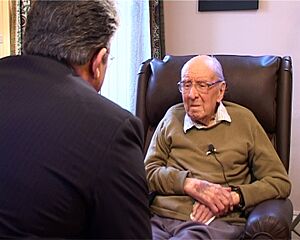W. Montgomery Watt facts for kids
Quick facts for kids
W. Montgomery Watt
|
|
|---|---|

Watt (right), being interviewed by Ali Akbar Abdolrashidi.
|
|
| Born |
William Montgomery Watt
14 March 1909 |
| Died | 24 October 2006 (aged 97) Edinburgh, Scotland
|
| Nationality | Scottish |
|
Notable work
|
Muhammad at Mecca (1953) Muhammad at Medina (1956) |
| Title | Professor of Arabic and Islamic Studies |
| Scientific career | |
| Institutions | Anglican Diocese of Jerusalem University of Edinburgh |
William Montgomery Watt (born March 14, 1909 – died October 24, 2006) was a Scottish historian and expert on the Middle East. He was also an Anglican priest. From 1964 to 1979, he taught about the Arabic language and Islamic studies at the University of Edinburgh.
Watt was one of the most important non-Muslim experts on Islam in the Western world. Many people, including Muslims, respected his work greatly. His detailed books about the Islamic prophet Muhammad, titled Muhammad at Mecca (1953) and Muhammad at Medina (1956), are still very important in the field of Islamic studies.
Contents
Early Life and Learning
Watt was born in Ceres, Fife, Scotland, on March 14, 1909. His father was a minister in the Church of Scotland. Sadly, his father passed away when William was only 14 months old.
His Career
Becoming a Priest
Watt became a deacon in the Scottish Episcopal Church in 1939. He then became a priest in 1940. He worked in London from 1939 to 1941. When his church was damaged during The Blitz (bombings in World War II), he moved to Edinburgh. From 1943 to 1946, he worked as an expert in Arabic for the Anglican Bishop in Jerusalem.
After 1946, Watt focused more on his academic career. However, he continued to serve as a priest part-time. He was an honorary curate (a type of assistant priest) in Edinburgh for many years. He also joined the Iona Community, a Christian group in Scotland, in 1960.
Working as a Professor
Watt became a Professor of Arabian and Islamic Studies at the University of Edinburgh in 1964. He held this position until he retired in 1979. He was sometimes called "The Last Orientalist" because of his deep knowledge of Eastern cultures.
He also taught as a visiting professor at other universities. These included the University of Toronto and Georgetown University.
Later Years
William Montgomery Watt passed away in Edinburgh on October 24, 2006, when he was 97 years old. He had four daughters and one son with his wife, Jean. They enjoyed family holidays in the Scottish village of Crail. After his death, writer Richard Holloway said that Watt spent his life fighting against intolerance.
Awards and Recognition
Watt received several important awards for his work. He was given the American Giorgio Levi Della Vida Medal. He was also the first person to win the British Society for Middle Eastern Studies award for excellent scholarship.
He also received an honorary doctorate degree from Aberdeen University.
His Ideas and Views
Watt believed that the Qur'an (the holy book of Islam) was inspired by God. However, he did not think every single part of it was perfectly true without any mistakes.
Martin Forward, another scholar who studies Islam, said that Watt's books showed how much the Prophet Muhammad cared about social justice. Watt thought Muhammad was like an Old Testament prophet. He believed Muhammad came to bring back fairness and the idea of one God to the Arabs.
Carole Hillenbrand, a professor of Islamic History, noted that Watt was brave enough to share new and sometimes controversial ideas about religion. He often thought about how studying Islam changed his own Christian faith. He even started to rethink the Christian idea of the Trinity (God as Father, Son, and Holy Spirit). This was because Islam strongly teaches that God is one and undivided.
Watt thought that the word "persona" (which means "face" or "mask" in Latin) could help explain the Trinity. He believed it meant that God has three different "faces" or ways of showing Himself, but is still one God.
Some other scholars, like John Wansbrough and Patricia Crone, disagreed with some of Watt's ideas about how Islam began. However, Patricia Crone later said that some of their own earlier ideas on this topic were mistaken.
Important Books He Wrote
Watt wrote many books about Islam and its history. Here are some of his well-known works:
- The faith and practice of al-Ghazālī (1953)
- Muhammad at Mecca (1953)
- Muhammad at Medina (1956)
- Muhammad: Prophet and Statesman (1961) – This book summarizes his two major works about Muhammad.
- Islamic Philosophy and Theology (1962)
- Islamic Political Thought (1968)
- The Influence of Islam on Medieval Europe (1972)
- What Is Islam? (1980)
- Muslim-Christian Encounters: Perceptions and Misperceptions (1991)
- Islam: A Short History (1999)
Images for kids
 | Claudette Colvin |
 | Myrlie Evers-Williams |
 | Alberta Odell Jones |


